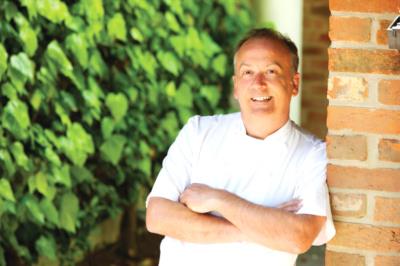31 Mar 2020

At 16, Luke started an apprenticeship in The Green Park Hotel, Bournemouth, before moving to the Dormy Hotel at Ferndown. He then completed work experience at Chewton Glen, where, in the summer of 1993, he became chef, and senior sous chef only ten months later. In November 2003, he was appointed executive head chef. Luke manages forty staff, controls a considerable budget, finds and procures top local produce, , plans, organises, socialises, and is a role model for his team. His enthusiasm, first kindled in his teens, still shines out and is reflected in the wonderful dishes served to the hotel's guests.
Chef Skills
Luke Matthews takes us through his personal experiences whilst being in the Culinary Industry. These key skills that young Chefs and industry professionals learn as part of their basic training.
My mother was a good cook, and she used to cook lots of stuff from scratch, which was quite unusual in those days. I grew up having a love of food. We used to grow a lot in the garden, which, again, in those days, was very unusual. I started my career as an apprentice chef in a small hotel in Bournemouth, then did some travelling around, and ended up at Chewton Glen in 1993; and I’m still here.
Nowadays it’s totally different to when I started. I’ve been cooking for 30 odd years now, and the way that I support the youngsters that I get in the kitchen far outweighs anything that was ever done with me. I genuinely care about the people who work for me, and I want to see them succeed and do well. I’m really keen on pushing my people forward. I’m a member of the Academy of Culinary Arts so I take specialised chef apprentices out of the college which brilliant. It’s a course where they stay with me for three years and I nurture them through the course and, nine times out of ten, they come through absolute spot on. I just love to see kids come here, work for me, and succeed. There’s nothing that gives me any more pleasure than seeing a young person come here, 16 or 17 years and leave 3 or 4 years later as a proper chef. A lot of the people that learn here go away for a couple of years and then come back again; they’ve gone out, spread their wings, and come back here because of what a fantastic place Chewton Glen is. We really do care and look after the people that work for us.
Listen; be prepared to work hard; always remember that the more you put into your life the more you get out of it.
It depends on what sort of level I’m taking them on. If I’m taking them on straight out of school or college I’m really more interested in what they’re like as a person. Will they fit into our team? Do they want to learn? Have they got a sense of humour? All these things which really are so important. I spend more time at work than I do with my family, and I want to work with people that I like and who I can have some fun with; it helps to make the day go. So if people will fit into our team, we can help them with everything else; it will come in time. But if they don’t fit into the team, then there’s not really much we can do about that normally. But if they have the right sort of mentality then they’re always going to do well here. Then, going up the scale, if I was looking for someone more senior, then obviously I’d be driven by where they were working before. Still, you’ve got to make the call when you interview them. Are they right for our team? Are they going to fit? Are they right for us? Meeting them face to face is important. We’ll give them a morning’s trial in the kitchen, and that will be as much about what they are like as a person as about their technical skill. Are we going to be able to work with them? It’s a team effort in the kitchen, we’re all relying on each other.
Listen, and learn from your mistakes. Everyone makes mistakes, and there’s nothing wrong with making mistakes, as long as you learn from them. You get better that way.